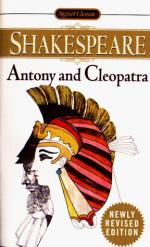|
This section contains 5,173 words (approx. 18 pages at 300 words per page) |

|
SOURCE: Lindley, Arthur. “Antony, Cleopatra, the Market, and the End(s) of History.” In Shakespeare Matters: History, Teaching, Performance, edited by Lloyd Davis, pp. 62-73. Newark: University of Delaware Press, 2003.
In the following essay, Lindley argues that Antony and Cleopatra associates Octavius with the centralization and monopolization of trade—that it shows he wants, in effect, to be the sole proprietor of the world, fixing the value of every commodity, including time. By contrast, the critic suggests, Cleopatra is linked not only with the festivity and unrestraint of carnival but also with the idea of free trade, for she believes that the value of commodities, even sexual love, is negotiable and constantly changing.
Commerce is the dirty secret of Bakhtin's theory of carnival. Throughout his definitive (if fictive) account in the first chapter of Rabelais and His World and elsewhere, he marginalizes what in practice is as inescapably...
|
This section contains 5,173 words (approx. 18 pages at 300 words per page) |

|


